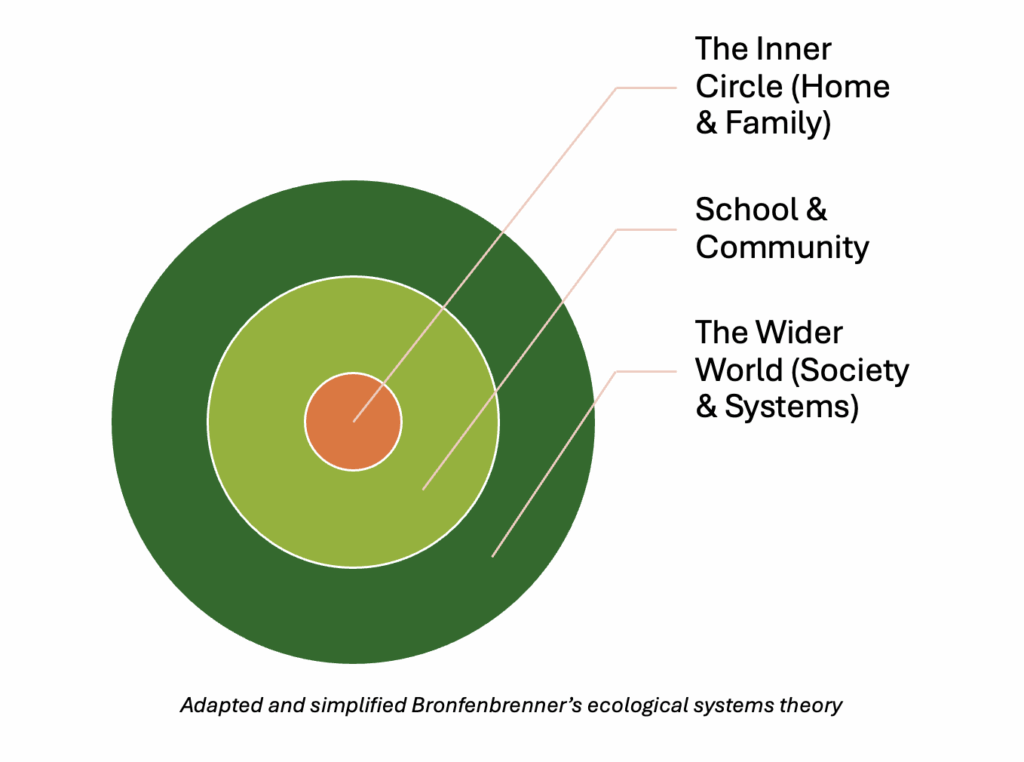The spaces we share with our neurodivergentAn individual whose brain functions differently from the (usually neurotypical) perception of what is “normal”. For example, an individual with autism, Asperger's syndrome, dyslexia, dyscalculia, dyspraxia, ADHD, OCD or Tourette Syndrome. children profoundly impact their daily lives. From creating sensory-friendly homes to advocating for inclusive schools, we can transform our environments to better support their needs.

- The Inner Circle (Home & Family) – The heart of a child’s world, where safety, routines, and sensory needs are nurtured. This is where family values, traditions, and cultural roots shape identity, belonging, and daily life.
- School & Community – Classrooms, therapists, and social groups shape development, while the fast-paced digital world adds another layer—impacting attention, communication, and how they engage with others.
- The Wider World (Society & Systems) – The outer layer where laws, policies, and political climates intersect with cultural attitudes and migration experiences. This shapes everything from disability rights and access to education to societal inclusion—determining whether our children encounter barriers or opportunities as they navigate the world.
Cultural Influences on Our Parenting Journeys
As parents, we bring our cultural backgrounds into how we understand and support neurodivergence. These perspectives shape everything from our expectations to our daily routines.
How This Affects Us:
- Perceptions of “normal” behaviour: How our cultures define what’s typical or expected
- Educational expectations: The academic pressures and support systems we grew up with
- Family structures: The role extended family plays in our care strategies
- Healing traditions: Alternative therapeutic approaches from our cultural heritage
Cultural Wisdom We Can Learn From:
Many traditional learning approaches already include what we now recognise as neurodivergent-affirming practices—movement breaks, hands-on learning, and multi-sensory teaching. These time-tested methods remind us that different ways of learning have always existed.
Parenting in Our Fast-Paced World (Without Burning Out)
We live in a society that glorifies constant busyness, but our neurodivergentAn individual whose brain functions differently from the (usually neurotypical) perception of what is “normal”. For example, an individual with autism, Asperger's syndrome, dyslexia, dyscalculia, dyspraxia, ADHD, OCD or Tourette Syndrome. children—and we as their parents—often thrive with a slower, more intentional rhythm.
Ways We Can Simplify:
- Protect downtime – Our children need recovery time after school or social events, and so do we.
- It’s okay to say no – We don’t have to accept every invitation or activity if it causes more stress than joy.
- Find our tribe – Connecting with other families who “get it” makes all the difference.
Here’s what matters most: We don’t need to chase picture-perfect parenting ideals. What works for our unique children—and our unique families—is what truly counts.
Parenting in Our Globalised Reality
Today’s connected world offers both opportunities and challenges for families like ours.
What This Means for Us:
- Global Support: The internet lets us access help, advice, and communities from around the world.
- Different Approaches: We often have to figure out which therapies or education methods work best, as recommendations vary between countries.
- Too Much Information: There’s so much advice online that it’s hard to know what’s trustworthy and what’s not.
A Quick Reflection Exercise
Here are three reflective questions for you to rate what influences your parenting style the most.
- How much does my cultural background influence my parenting approach?
*(1 = Not at all → 5 = Extremely influential)* - How much does my child’s daily environment (home, school, community) shape my parenting choices?
*(1 = Not much → 5 = A lot)* - How much do outside pressures (society, advice, expectations) impact how I support my child?
*(1 = Rarely → 5 = Constantly)*
If you’d like to explore this further or discuss any issues that may have come up, please contact Yaso by booking a free exploratory call using this link.
Finding Our Family’s Unique Path
There’s no single “right way” to parent a neurodivergentAn individual whose brain functions differently from the (usually neurotypical) perception of what is “normal”. For example, an individual with autism, Asperger's syndrome, dyslexia, dyscalculia, dyspraxia, ADHD, OCD or Tourette Syndrome. child. The best approach is one that:
✔ Honours our child’s neurological needs
✔ Respects our cultural values
✔ Adapts to our specific circumstances
✔ Remains flexible based on changing needs






